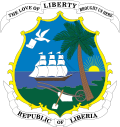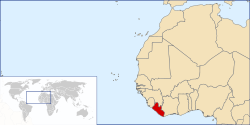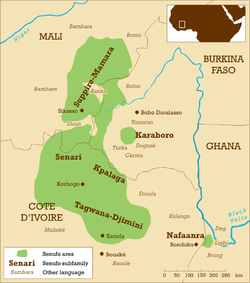Portal:Africa



Africa is the world's second-largest and second-most populous continent after Asia. At about 30.3 million km2 (11.7 million square miles) including adjacent islands, it covers 20% of Earth's land area and 6% of its total surface area. With nearly 1.4 billion people as of 2021, it accounts for about 18% of the world's human population. Africa's population is the youngest among all the continents; the median age in 2012 was 19.7, when the worldwide median age was 30.4. Based on 2024 projections, Africa's population will exceed 3.8 billion people by 2100. Africa is the least wealthy inhabited continent per capita and second-least wealthy by total wealth, ahead of Oceania. Scholars have attributed this to different factors including geography, climate, corruption, colonialism, the Cold War, and neocolonialism. Despite this low concentration of wealth, recent economic expansion and a large and young population make Africa an important economic market in the broader global context, and Africa has a large quantity of natural resources.
Africa is highly biodiverse; it is the continent with the largest number of megafauna species, as it was least affected by the extinction of the Pleistocene megafauna. However, Africa is also heavily affected by a wide range of environmental issues, including desertification, deforestation, water scarcity, and pollution. These entrenched environmental concerns are expected to worsen as climate change impacts Africa. The UN Intergovernmental Panel on Climate Change has identified Africa as the continent most vulnerable to climate change.
The history of Africa is long, complex, and varied, and has often been under-appreciated by the global historical community. In African societies the oral word is revered, and they have generally recorded their history via oral tradition, which has led anthropologists to term them "oral civilisations", contrasted with "literate civilisations" which pride the written word. African culture is rich and diverse both within and between the continent's regions, encompassing art, cuisine, music and dance, religion, and dress.
Africa, particularly Eastern Africa, is widely accepted to be the place of origin of humans and the Hominidae clade, also known as the great apes. The earliest hominids and their ancestors have been dated to around 7 million years ago, and Homo sapiens (modern human) are believed to have originated in Africa 350,000 to 260,000 years ago. In the 4th and 3rd millennia BCE Ancient Egypt, Kerma, Punt, and the Tichitt Tradition emerged in North, East and West Africa, while from 3000 BCE to 500 CE the Bantu expansion swept from modern-day Cameroon through Central, East, and Southern Africa, displacing or absorbing groups such as the Khoisan and Pygmies. Some African empires include Wagadu, Mali, Songhai, Sokoto, Ife, Benin, Asante, the Fatimids, Almoravids, Almohads, Ayyubids, Mamluks, Kongo, Mwene Muji, Luba, Lunda, Kitara, Aksum, Ethiopia, Adal, Ajuran, Kilwa, Sakalava, Imerina, Maravi, Mutapa, Rozvi, Mthwakazi, and Zulu. Despite the predominance of states, many societies were heterarchical and stateless. Slave trades created various diasporas, especially in the Americas. From the late 19th century to early 20th century, driven by the Second Industrial Revolution, most of Africa was rapidly conquered and colonised by European nations, save for Ethiopia and Liberia. European rule had significant impacts on Africa's societies, and colonies were maintained for the purpose of economic exploitation and extraction of natural resources. Most present states emerged from a process of decolonisation following World War II, and established the Organisation of African Unity in 1963, the predecessor to the African Union. The nascent countries decided to keep their colonial borders, with traditional power structures used in governance to varying degrees. (Full article...)
Selected article –
Kerma was the capital city of the Kerma culture, which was founded in present-day Sudan before 3500 BC. Kerma is one of the largest archaeological sites in ancient Nubia. It has produced decades of extensive excavations and research, including thousands of graves and tombs and the residential quarters of the main city surrounding the Western/Lower Deffufa.
The locale that is now Kerma was first settled by hunter-gatherers around 8350 BC, during the Mesolithic. Between 5550 BC and 5150 BC, the site was mostly abandoned, possibly due to decreased Nile flow during this time interval. A second hiatus in occupation occurred between 4050 BC and 3450 BC, likely as a result of minimal flow from the White Nile. Around 3000 BC, agriculture developed and a cultural tradition began around Kerma. Kerma later developed into a large urban center that was built around a large adobe temple known as the Western Deffufa, which was built after 1750 BC. A state society formed between 2550 BC and 1550 BC, with a significant decrease in cattle breeding being evidenced by the archaeological record around 1750 BC. Evidence for copper metallurgy appears from c. 2200–2000 BC. As a capital city and location of royal burials, Kerma sheds light on the complex social structure present in this society. (Full article...)
Featured pictures –
Did you know (auto-generated) -

- ... that the Enterprise, a black newspaper in Omaha, supported a separate African American department at the 1898 Trans-Mississippi Exposition?
- ... that Mary Jane Patterson, whose mother was an African-American slave, gained a BA degree in 1862 having taken a "gentleman's course"?
- ... that the bronze statue atop Thomas Eyre Macklin's 1907 South African War Memorial in Newcastle became known as the "Dirty Angel"?
- ... that the pulse stops during the soliloquy of In C Mali?
- ... that before the swearing-in of convicted murderer Kenny Motsamai as an MP, South African Chief Justice Mogoeng Mogoeng cited a constitutional requirement prohibiting felons from becoming MPs?
- ... that desert kites in the Middle East and North Africa were used as traps for wild game?
Categories
Selected biography –

Didier Drogba is a former professional association footballer who represented the Ivory Coast national team from 2002 to 2014. He made his debut for the Ivory Coast in a 2004 African Cup of Nations qualification match against South Africa in September 2002. He scored his first international goal on his next appearance for the Ivory Coast, in a 3–0 win against Cameroon in a friendly in Châteauroux, France. On 8 August 2014, Drogba announced his retirement from international football with a record of 65 goals in 105 appearances, ending his international career as his country's all-time top scorer, remaining so as of November 2018[update], and with the third-most appearances, behind Didier Zokora (123) and Kolo Touré (120).
Drogba scored one hat-trick during his international career, scoring the opening three goals in a 6–1 victory for the Ivory Coast against Burundi in a 2004 African Cup of Nations qualification match. He has also scored a goal twice in a match on twelve occasions, including one against Senegal in October 2012; the game was abandoned shortly after Drogba's second goal as fans rioted, throwing food and drinks onto the pitch, although the Confederation of African Football declared the 2–0 victory would stand. He has scored more goals against Benin (seven) than any other country. Nineteen of his goals were scored in his hometown stadium of Stade Félix Houphouët-Boigny in Abidjan. Fourteen of Drogba's goals were scored from the penalty spot. (Full article...)
Selected country –
 |
 |
|

| ||
Liberia, officially the Republic of Liberia, is a country on the west coast of Africa, bordered by Sierra Leone, Guinea, and Côte d'Ivoire. Liberia, which means "Land of the Free", was founded as an independent nation, with support of the American government, for free-born and formerly enslaved Blacks and, thus, is one of only two nations in Africa (along with Ethiopia) that didn't fall under European domination. Since 1989, it has witnessed two civil wars, the First Liberian Civil War (1989 – 1996), and the Second Liberian Civil War (1999 – 2003), that have displaced hundreds of thousands of people and destroyed the country's economy.
The population of over 3 million comprises 16 indigenous ethnic groups and various foreign minorities. Indigenous peoples comprise about 95% of the population, the largest of which are the Kpelle in central and western Liberia. Americo-Liberians, who are descendants of freed slaves that arrived after 1821, make up an estimated 5% of the population. As of 2006, Liberia has the highest population growth rate in the world (4.91%). (Read more...)
Selected city –
Cape Town is the legislative capital of South Africa. It is the country's oldest city and the seat of the Parliament of South Africa. Cape Town is the country's second-largest city, after Johannesburg, and the largest in the Western Cape. The city is part of the City of Cape Town metropolitan municipality.
The city is known for its harbour, its natural setting in the Cape Floristic Region, and for landmarks such as Table Mountain and Cape Point. In 2014, Cape Town was named the best place in the world to visit by The New York Times, and was similarly ranked number one by The Daily Telegraph in both 2016 and 2023. (Full article...)
In the news
- 28 March 2025 –
- Russian authorities say that yesterday's sinking of the Sindbad submarine in Hurghada, Egypt, killing six Russians, happened during boarding and not due to a collision as reported. (The National)
- 27 March 2025 – Haitian crisis
- A Kenyan police officer deployed in Haiti as part of the Multinational Security Support Mission is killed in a suspected gang ambush, according to Haitian authorities. Kenya has confirmed that the officer is missing but has not yet verified his death. (BBC News)
- 27 March 2025 –
- At least six people are killed and 39 others are rescued after a Sindbad submarine carrying Russian tourists sinks off the Red Sea coast of Hurghada, Egypt. (BBC News)
- South Sudanese vice president Riek Machar is detained by security forces following an arrest warrant on "unclear charges", according to his spokesperson. The Sudan People's Liberation Movement-in-Opposition says Machar's arrest has effectively ended the 2018 peace agreement which ended the civil war. (Sky News)
- 26 March 2025 – Sudanese civil war
- Battle of Khartoum
- RSF occupation of the Khartoum International Airport
Updated: 11:05, 30 March 2025
General images -
Africa topics
More did you know –
- ... that at approximately 5,000 years old, the Lothagam North Pillar Site is thought to be the earliest and largest monumental cemetery in eastern Africa?
- ... that a 2020 study found that African countries which allowed foreign funding of NGOs had a higher voter turnout?
- ... that Essop Moosa, who was of Indian origin, became the first non-white player to play for an all-white soccer team in South Africa, appearing under a pseudonym?
- ... that the Seventh German Inner Africa Research Expedition served as cover for a secret First World War espionage mission?
Related portals
Major Religions in Africa
North Africa
West Africa
Central Africa
East Africa
Southern Africa
Associated Wikimedia
The following Wikimedia Foundation sister projects provide more on this subject:
-
Commons
Free media repository -
Wikibooks
Free textbooks and manuals -
Wikidata
Free knowledge base -
Wikinews
Free-content news -
Wikiquote
Collection of quotations -
Wikisource
Free-content library -
Wikispecies
Directory of species -
Wikiversity
Free learning tools -
Wikivoyage
Free travel guide -
Wiktionary
Dictionary and thesaurus



























































































